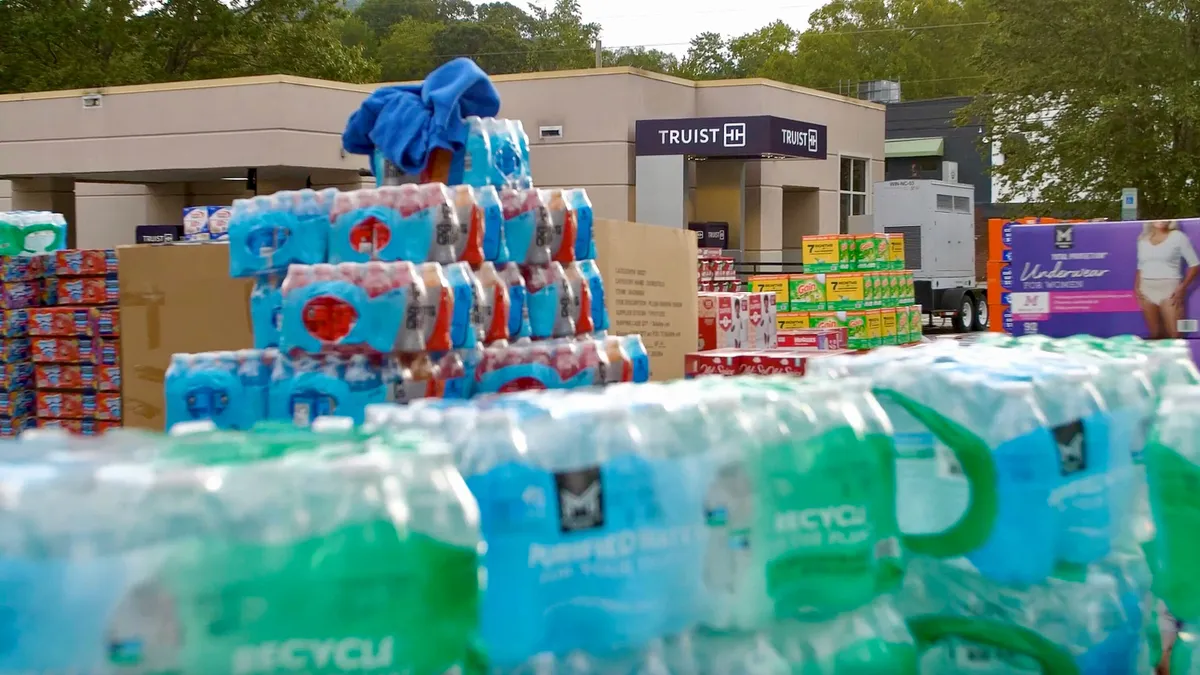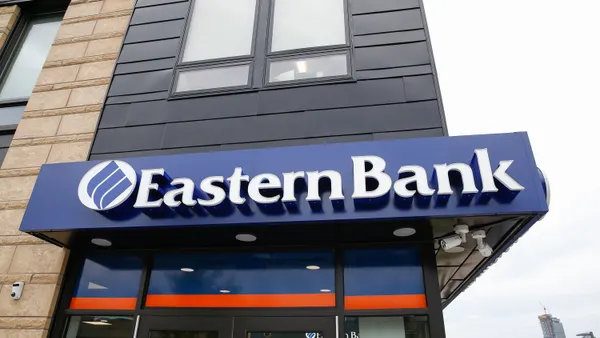After Hurricane Helene ravaged the mountainous areas of western North Carolina and eastern Tennessee last month, bringing catastrophic flooding and wiping out power and water for many areas, the first step for Truist was connecting with employees by phone to confirm their safety and offer assistance.
Within five days, Truist had confirmed all of its workers were accounted for, said Aaron Slate, Truist’s Asheville market president, who’s lived in the city for more than two decades.
From there, “it was kind of just, where do you start?” Slate said.
Western North Carolina is grappling with widespread destruction from Helene, which has killed at least 227 people, and recovery is projected to be costly and time-intensive. Following the storm, banks that serve the area have endeavored to provide their employees and customers with basic supplies, financial help or a shower.
The initial challenge for Charlotte, North Carolina-based Truist – which has about 13,000 employees within Helene’s path – was helping staffers who requested assistance to secure temporary housing or transportation support, Slate said.
Western North Carolina, as well as areas of eastern Tennessee and western South Carolina, lacked power for days; power has yet to be restored to some areas.
When credit cards couldn’t be used, the bank sought to make sure its ATMs were fully stocked and functional. “Cash suddenly became very, very important for this area,” Slate said.
As of Monday, Truist had opened about 80% of its drive-thru locations and branches in western North Carolina. Some have sustained damage from the flooding; in the meantime, Truist is offering banking services through a mobile branch, Slate said.

In addition to truckloads of crucial supplies, Truist’s west Asheville branch has added mobile shower and laundry units open to anyone since the area largely remains without water. “We’re meeting needs exactly where they’re at right now,” Slate said.
The need for cash has diminished as power has been restored for many, but business clients have been eager to ensure the availability of funds or secure deferrals on loan payments, bank leaders said.
Truist aims to be sensitive to clients’ needs and is approaching things like outstanding loans on a case-by-case basis, Slate said.
“Each client that I’ve spoken with, if they’ve had a need, we’ve been able to figure out a way either to be able to help them directly, or connect them with the right resources,” Slate said. He noted a number of resources that have popped up in the wake of Helene, including a recovery fund from Mountain Bizworks, a community development financial institution.
As well as Truist, other banks such as Raleigh, North Carolina-based First Citizens are also “taking a patient approach,” a spokesperson said.
“Our bankers on the ground are helping customers discuss debt relief options, including disaster relief extensions for loans, consumer and business disaster relief loans, credit card payment deferrals and lease payment deferrals,” the spokesperson said in a Wednesday email.
Nearly all of that bank’s branches and ATMs in affected areas have reopened, and First Citizens has committed $3.5 million in donations and financial support to Helene revitalization efforts, the spokesperson said.
Charlotte, North Carolina-based Bank of America, too, is offering financial assistance to clients and has pledged $1 million to support those affected by the storm.
Helene “was devastating to experience as a resident and a bank teammate who has worked with our clients and the community for more than nine years,” said David Dowd, the bank’s Asheville president, in a Wednesday statement. The bank is committed to supporting the community, he added.
‘Well-tested’ approach
For First Horizon, all of the lender’s banking centers are open except one in Boone, which experienced flooding damage. There, the Memphis, Tennessee-based bank has set up a mobile banking center, in addition to ATMs in Boone and Asheville, said Laura Bunn, First Horizon’s mid-Atlantic regional president.
First Horizon hopes to reopen the closed branch in two to three months, Bunn said.
“Unfortunately, with our footprint in the southeast, we're pretty experienced with hurricane season, and hurricane preparedness and recovery efforts,” said Bunn, who’s personally accustomed to the effects of hurricanes, having grown up in eastern North Carolina. “We've got a well-tested plan and approach to providing support to affected associates and to our clients and communities.”

In the Asheville area, water remains “a dire need,” not just for drinking, but to flush toilets, she said. Bunn’s team is meeting each day to review employee needs as they change, and the bank is facilitating access to water so people don’t have to use bottled drinking water to flush their toilets.
To support employees, First Horizon has delivered meals, fuel, water, ice and other essential supplies, and is providing mobile shower units and weekly laundry services for staffers still without water, Bunn said.
In keeping in touch with clients to assess their current needs and find out if they need relief from banking service fees or charges, the bank has already begun to process deferrals on loans, Bunn said.
The biggest challenge for First Horizon has been reaching all of its clients, and for its business clients to account for all of their associates, Bunn noted, given the hard-to-reach locations some mountain residents live in and the ongoing lack of power in some areas.
“This was a really different storm in a different spot,” she said.
Dispersed operations a benefit
Asheville-based HomeTrust’s experience during Helene has underscored something it had adjusted to amid the COVID-19 pandemic, said Megan Pelletier, the bank’s chief operations and people officer.
Having staffers dispersed geographically, in places like Charlotte or Georgia, “was to our benefit in the wake of Helene,” because it meant there was no service disruption for the bank’s customers through the storm and its aftermath — particularly essential for HomeTrust’s customers not in the Asheville area, she said.
“It’s a lesson we learned during Covid, around flexibility, and it served us well during this event,” she added.
HomeTrust, whose footprint covers N.C., S.C., Tennessee, Virginia and Georgia, has about 300 employees in western North Carolina areas devastated by Helene, Pelletier said.
Although the bank has had to augment its hours based on the availability of employees and what they’re grappling with, “for the most part, we’ve had our doors open since last Monday,” she said.
Two HomeTrust branches remain closed, due to impacts to facilities, and employees from those branches have been deployed to other nearby locations, she said. The bank has also sought to work with customers to defer loan payments as necessary.
“What I’ve seen is a really humanistic approach to work and business over the last two weeks,” she said.
One of the bank’s leaders in Asheville, who didn’t lose power or water has been making home-cooked meals each day, to provide a hot lunch for bank employees who can make it to the office. Another HomeTrust employee who left town offered his car to a colleague in need.
Similarly, Slate and Pelletier each praised the way the area banking community has come together, in spite of competition. Pelletier lauded the North Carolina Bankers Association for its efforts, including setting up a relief fund for bank employees in affected areas, and noted fellow Southeastern lender SouthState Bank sent HomeTrust a slew of donated supplies for employees.
“People are really just stepping up to support one another in ways that you typically don’t see in business every day,” she said.
Like First Horizon, HomeTrust has established an employee relief fund. In addition to physical needs, providing mental health assistance is crucial, too, Pelletier said.
“What has occurred in western North Carolina is — it’s going to take a long time, both physically, for the community to recover, but also mentally,” she said. “Ensuring that we really are providing those resources to our employees, and making them accessible in their time of need, has been paramount.”
Milton, too
Truist and First Horizon have each pledged money to help communities heavily affected by Helene. But the banks braced for another storm Wednesday, as Hurricane Milton tore across Florida, where the two lenders also have a number of branches.
Truist has committed $1 million to help that state in the storm’s wake. “What the bank has provided to us up here in western North Carolina, the bank is ready to do down in Florida,” Slate said Wednesday.
After Milton clears out, “as soon as it is safe to do so and our teams assess damages, our humanitarian aid team will activate to determine and deploy needed supplies to impacted communities,” a Truist spokesperson said in a Thursday email. “We will work diligently to ensure we provide the critical banking services our communities rely on by getting our branch network operational and determining the deployment of mobile banks and generators.”
A First Horizon spokesperson said the lender has a “battle-tested plan” to respond to Milton and noted Florida is more accustomed to crisis management and hurricane preparedness. The bank planned to first ensure its employees are safe, then provide as much continuous banking support to clients as possible and aid in community recovery.
The bank strives to be among the first to reopen its doors, “at least a drive-thru, following a disaster. That’s something we really think is important if we can achieve it,” the First Horizon spokesperson said.
On Thursday, First Horizon had closed branches in Tampa, Sarasota/Bradenton, Fort Myers, Naples, Orlando, Palm Beach/Broward and north Florida, according to the bank’s website.












